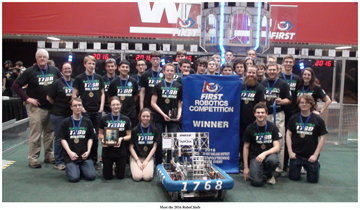
By Ann Needle

If the thought of holiday gifts taking over your home next month brings on a frosty feeling, there is an easy way to make room. Donate your clothes, appliances, and – just about everything else — to the Nashoba RoboChiefs Robotics team, and the team makes the profit while you create some breathing room.
For every item donated to the Nashoba Regional High School Robotics team, the team receives 20-cents per pound for soft goods, and 5-cents per pound for hard goods, according to Stow’s Lexi Strauss, parent of RoboChiefs member Andrew and coordinator of this first-of-its-kind drive for the team. The RoboChief’s goal is to make about $1,600 from the drive, she said. Strauss reported that all donated items will go to Savers, a chain of thrift stores that gifts portions of its proceeds to charities nationwide.
And the list of accepted items is as lengthy as the roster of items sold at Savers: clothing, shoes, and accessories; bedding and towels; backpacks; CDs, DVDs, and books; electrical items; kitchen gadgets (from spatulas to small appliances); toys and games; “knick-knacks;” and sporting goods. Items can be used or new, but should be clean and in good, sell-able condition.
As Strauss commented, it may be easier to remember what Savers will NOT accept, which is small furniture; auto parts and tires; paints and painting supplies; pesticides; flammable products; hazardous materials; cleaning supplies; and building materials.
The plan is to have donations brought to the front of the high school (12 Green Rd., Bolton) on Saturday, Nov. 19, from 8am to 1pm. However, for those who cannot be there and want to arrange a donation, email Strauss at [email protected], and write “Robotics fundraiser” in the subject line.
Prepping for the Big Build
Last spring the RoboChiefs made it to the FIRST Robotics international competition (in St. Louis) for the first time, after competing at the state and local levels for several years, Strauss said. And that lays out new challenges for the team as it hopefully continues to compete at more elite levels.
The team’s first fundraising objective is to have enough money so it does not need to dismantle last year’s robot for parts for this year’s creation, Strauss said. On a larger scale, the team may be able to aim to build two robots. Strauss noted that, after the FIRST teams receive the year’s challenge in January, each has 6 weeks to build its robot, which must then be shipped to competition on deadline. As a result, many seasoned, well-funded teams create two robots, shipping one off and using the other for practice, and/or build the playing field that replicates where the robot will operate, she said.
“Nashoba Robotics has an extremely tight budget,” at about $30,000, compared with $100,000 or so larger teams often have at hand, Strauss estimated. Still, she stressed that the $30,000 budget will need supplementing from business sponsors, user fees, raffles, and NRHS. The need to count every dollar could have an upside; Strauss maintained that, in the FIRST world, “The reputation is they[the RoboChiefs] are one of the most student-driven teams.” The students do all of their own robot CAD (computer-aided design) and coding, which is actually considered unusual for FIRST teams, she said.
The RoboChiefs’ year-round fundraising efforts have ranged from Andrew Strauss walking his neighborhood collecting donations in trash bags toted by wires, to recruitment of several major sponsors, including Bose and Clinton Savings Bank. Strauss emphasized that the team is constantly seeking more sponsors among corporations and individuals, with (tax-deductible) donation information available at www.nashobarobotics.com. Not to miss any angles, the RoboChiefs also are registered on Amazon Smile, which donates a portion of any purchase on the Amazon site to the team. (However, shoppers must go through smile.amazon.com when buying.)
When asked how she juggles so many fundraising outlets for the team, Strauss laughed, “I’m a crazy robotics mom.”